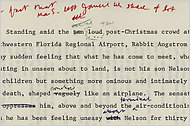 The New York Times takes a peek at the John Updike archive at Harvard University and examines the various drafts he did of the first few paragraphs of RABBIT AT REST:
The New York Times takes a peek at the John Updike archive at Harvard University and examines the various drafts he did of the first few paragraphs of RABBIT AT REST:
Though he was known and envied for writing rapidly and easily and revising very little — a reputation he encouraged — the archive demonstrates the painstaking care he took to establish the tone and atmosphere of his novels.
Cartons deposited in the early 1990s offer a synoptic map of “Rabbit at Rest,” the Pulitzer Prize-winning novel that concludes the earthly transit of Harry Rabbit Angstrom, the former Pennsylvania high school basketball king who remains Updike’s most famous creation.
An Eagle Typing box contains a handwritten draft, completed in January 1989. Hurried on to the page (in pencil on the back of the typescript of a previous book), the flowing sentences are constellated with crossings out, insertions and circled text as Updike honed, phrase by phrase, the middle-American idiom and the hurtling present-tense that are signatures of the Rabbit cycle.
So numerous were the emendations to the opening scene, set in a Florida airport, that Updike stapled a typed page to the handwritten draft, in which the initial paragraphs are thoroughly resequenced to create an effect less linear and more interior. Further reworking the opening paragraph, to draw out its theme of impending death, Updike made subtly significant improvements.
“The sensation chills and oppresses him, above and beyond the air-conditioning,” he had first typed. Retouching by pen, he tightened the phrasing and also inserted an inspired pun: “The sensation chills him, above and beyond the terminal air-conditioning.”
But the best part of the Times piece is this link that shows the actual drafts, from his handwritten scribbles to the typed manuscript. It’s fascinating stuff. And that’s not all. There’s also a link to a video interview with Updike filmed shortly before his death.

I find this fascinating, and telling. In three days, there’s not a single comment about this most interesting glimpse into John Updike’s editing process, but the post below that deals with self-publishing on Kindle has nine comments appended to it.
I’ve long believed that too many writers (especially novelists) allow marketing & promotion, social networking, and other such activities to distract them from their writing–which, I believe, is very much to their detriment.
Whether this disparity in the amount of commentary generated by these posts offers further evidence of my belief, or is simply an aberration, I don’t know. But it’s interesting, I think.
Phil, I just looked at Lee’s page today and noticed the same thing, so I came on here to make a similar comment. Let’s face it, most of the Kindle-loonies aren’t interested in refining their writing enough to get past those bad old “New York Gate Keepers.” So why should they be interested in an article like this? No matter how bad their work is, they can now see it published moments after writing “Teh Edn” on their first draft.
I think most of these punks get nauseous at the sight of the word “rewriting.”